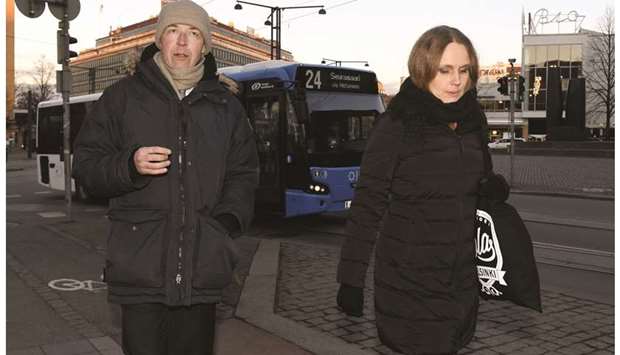Finland’s leftist Social Democrats yesterday won a parliamentary election by a slight margin with 18.9% of votes, partial results showed, amid mounting concern among voters over the future of the country’s expensive welfare system.
The centre-right National Coalition of outgoing Finance Minister Petteri Orpo came in second, with 16.7% of the advance votes, after 47% of ballots were counted. The Centre Party of Prime Minister Juha Sipila scored third, with 15.5%.
If final results confirm the outcome, Social Democrat leader Antti Rinne could become Finland’s first leftist prime minister in two decades.
But the process of putting together a coalition could be drawn out because a fragmented parliament.
“For the first time in a long time, Social Democrats are the largest party,” Rinne, a 56-year-old former union leader, told reporters.
With the top contenders running close, the final results could still show another group winning and getting the first shot at forming a government.
A relatively strong showing by the nationalist Finns Party, which scored 15.4%, could further complicate coalition talks, with most party leaders ruling out any co-operation with them.
At the stake in the election is the future shape of Finland’s welfare system, a pillar of the Nordic social model, which the leftists want to preserve through tax hikes and the centre-right wants to see streamlined because of rising costs.
The eurosceptic Finns call for limits on environmental policies, arguing the nation has gone too far in addressing issues such as climate change at its own expense, as well as a revamp of its immigration stance.
“Finland isn’t capable of saving the world,” Jussi Halla-aho, 47, said at one of the party’s news conferences. “We have already done our part,” he said.
The Finns’ stance on environmental policies, which includes an opposition to a proposed tax on meat consumption, appeals to rural voters in particular who fear soaring fuel costs and resent any efforts to change what they see as the traditional Finnish way of life.
With the European Parliament election less than two months away, the Finnish ballot is also being watched in Brussels.
A strong result for the Finns Party could bolster a nationalist bloc threatening to shake up EU policy-making.
The success of the Social Democrats would mark a departure for Finland and the region, where leftist parties have struggled in recent years, yielding some of their hold on the working class vote as nationalist parties have emerged.
In Sweden, Prime Minister Stefan Lofven last autumn clung to power after his Social Democrats suffered their worst parliamentary election result in more than a century, enlisting the support of two liberal parties with a pledge to enact some right-wing policies.
In Denmark, which holds an election in June, the Social Democrats are gaining ground, in part after espousing the populists’ anti-immigrant rhetoric.
Underscoring the growing confidence among far-right politicians in Europe, anti-immigration parties have announced plans to join forces following the May 26 EU election, in a move that could give them major say in how the continent is run.

Finns Party chairman Jussi Halla-aho and his wife Hilla Halla-aho arrive at the Finnish Parliament Annex in Helsinki yesterday.
